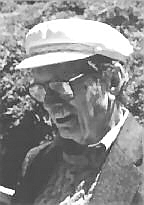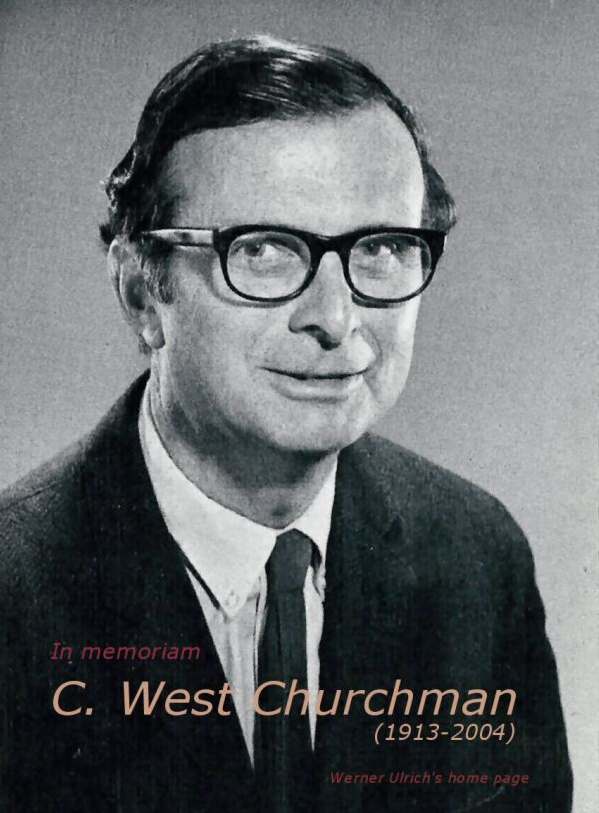By Kathleen Maclay, Media Relations | 31 March 2004
BERKELEY – Charles West Churchman, a professor emeritus at the University of California, Berkeley's Haas School of Business who was a pioneer in management science and ethics, died Sunday (March 21) in a Bolinas nursing home at the age of 90. He died of complications from Parkinson's disease.
During a career spanning six decades, Churchman investigated a vast range of topics such as accounting, research and development management, city planning, education, mental health, space exploration, education, and peace and conflict studies.
He consulted over the years for NASA, the U.S. Fish and Wildlife Service, the National Institutes of Health, the National Science Foundation and many other organizations.
Andrew Shogan, associate dean and professor at the Haas School, said that Churchman is among a handful of persons who each is widely regarded as a "founding father" of the field of knowledge known as management science, operations research or decision sciences. The field uses mathematical models to gain insights into a diverse set of decision problems arising in business, industry and government.
"After spending much of his career focusing on applied mathematics, West devoted much of his subsequent work to social issues, such as world hunger," said Shogan, who joined the Haas School in 1974, when Churchman was a senior professor.
Churchman's wife Gloria said the primary focus of her husband's work was to emphasize the ethical aspects of management science.
Churchman was born in Philadelphia. He earned his B.A. in philosophy in 1935, his master's in philosophy in 1936, and his Ph.D. in symbolic logic in 1938, all from the University of Pennsylvania.
"I'm a planner, but I'm also a philosopher," he told the San Francisco Sunday Examiner & Chronicle in 1982. "A planner finds out what an organization's goals should be. He determines problems and suggests solutions. He puts the pieces together so that the people who make the decisions can make better decisions.
"As a philosopher, I'm interested in such questions as: How do we know the plan is going to work? ... Is the plan ethical?"
During World War II, Churchman headed the mathematical section of the U.S. Ordnance Laboratory at the Frankford Arsenal in Philadelphia and devised a way to test small arms ammunition and detonators based on the statistical methods of bioassay.
He joined the University of Pennsylvania's philosophy department in Philadelphia as an assistant professor in 1939 and was department chair from 1945 to 1948. In 1948, he joined the philosophy department of Wayne University (now Wayne State University) in Detroit as an associate professor.
Churchman branched out in 1950, joining the Case Institute of Technology in Cleveland (now Case Western Reserve University) as a professor of engineering administration, organizing the first operations research academic group. There, he helped design the first master's and doctoral programs in operations research.
Churchman also co-authored the first operations research text, "Introduction to Operations Research," in 1957. The dozen books he wrote include "The Systems Approach and Its Enemies" (1979), "The Design of Inquiring Systems" (1971), "Challenge to Reason" (1968), and "Prediction and Optimal Decision" (1961).
He joined the School of Business Administration at UC Berkeley in 1958 and initiated master's and doctoral programs in operations research. He also helped found the Center for Research in Management Science.
He taught such courses as the philosophy of systems science, introduction to ethics, and value assumptions of planning and systems design. After his retirement in 1981, Churchman taught peace and ethics in the campus's Peace and Conflict Studies for 13 years.
From 1964 to 1970, Churchman was appointed associate director and research philosopher at UC Berkeley's Space Sciences Laboratory, directing its social sciences program.
In 1972, Churchman was part of a group that developed the plans for the International Institute for Applied Systems Analysis, a non-governmental research institute sponsored by scientific organizations from 17 countries. Its task was to research systems analysis for models for information and forecasting for use in energy, the environment and resources, agriculture and other fields.
He also headed a 30-member Mars Investigation Group that researched an intriguing 1976 Viking I spacecraft photo of Mars.
In 1983, Churchman received the Berkeley Citation, one of the campus's highest awards. He was awarded honorary doctorates from Washington University of St. Louis, the University of Lund, Sweden, and Umeå University in Sweden.
Although Gloria Churchman said her husband's work was his life, she said he also enjoyed growing roses and listening to classical music.
In one of four H. Rowan Gaither Lectures given by Churchman in 1981, he mused that the essence of philosophy "is to pose serious and meaningful questions that are too difficult for any of us to answer in our lifetimes. Wisdom, or the love of wisdom, is just that: thought likes solutions, wisdom abhors them."
In addition to his wife,*) Churchman is survived by his son, Josh Wharton Churchman of Bolinas, and two grandchildren. Funeral services will be private. A public memorial service will be announced later.
Memorial contributions may be sent to the Parkinson's Institute, 1170 Morse Ave., Sunnyvale, CA 94089-1605.

 Remembering
C. West
Churchman (1913-2004) The
grand old man of the "systems approach" died on Sunday, 21st of March, in
Bolinas, California. He was 90 years old.
Remembering
C. West
Churchman (1913-2004) The
grand old man of the "systems approach" died on Sunday, 21st of March, in
Bolinas, California. He was 90 years old. 